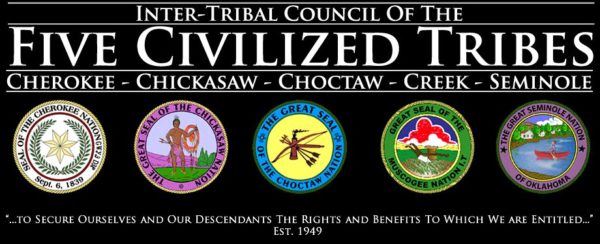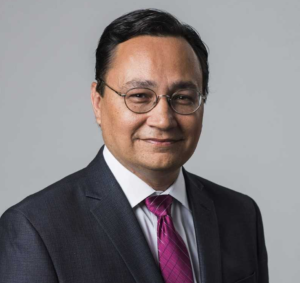
- Details
- By Chuck Hoskin Jr
The Inter-Tribal Council of the Five Civilized Tribes is comprised of the governments of the Cherokee, Chickasaw, Choctaw, Muscogee (Creek) and Seminole tribes and works to protect tribal self-determination and sovereign rights. These five tribal nations collectively represent more than 750,000 Indian people throughout the United States, with the largest concentration in Oklahoma.
It was an honor to be elected president of ITC at the organization’s recent quarterly meeting held at the Hard Rock Hotel and Casino Tulsa, and I look forward to serving in that capacity for the upcoming year.
 Cherokee Nation Principal Chief Chuck Hoskin, Jr.
Cherokee Nation Principal Chief Chuck Hoskin, Jr.
I look forward to working with the other tribal leaders: Chickasaw Nation Governor Bill Anoatubby, Choctaw Nation Chief Gary Batton, Seminole Nation Principal Chief Greg Chilcoat and newly elected Muscogee (Creek) Nation Principal Chief David Hill. While each tribal government has its own unique culture and history, our five tribes share similar issues and concerns, including how we best provide critical services - education, health care and housing - to our citizens.
Working in solidarity means we can better protect our self-governance. By sharing best practices and successful ideas, we can do more good for all our citizens and our state. We have a long and successful history of forging partnerships and building coalitions that improve the lives of all Oklahomans.
Collaboration at the Inter-Tribal Council goes beyond tribal leaders. The organization also brings together tribal councilors and employees of the member tribes. We all benefit by being involved and are able to celebrate in the achievements of the participating tribal governments. All of us, together, promote positive agendas at the federal and state levels. Resolutions approved by the Inter-Tribal Council establish a unified message for our tribes that is more powerful than any of us would be on our own.
Founded in 1949, it is one of the oldest and largest tribal organizations in America. A longstanding spirit of unity defines the council, and today it is as relevant and important as ever, maybe more so, as we stand united on critical issues facing our sovereign governments. Enemies of our tribal sovereignty will always attempt to divide us, but when we work together, we leverage resources to help even more people, including our non-Native neighbors.
In Oklahoma, we have the largest concentration of Native people in the U.S., and our tribal governments are strong. Individually, each of our tribes is doing positive things for elders, youth and our communities. This benefits not only our tribal citizens, but all of Oklahoma.
I look forward to leading this essential organization in 2020, knowing the leaders of the Five Tribes believe in protecting our tribal rights. We remain united on important issues, including government-to-government relationships, compact discussions, economic development, budget issues, cultural preservation and access to quality health care for everyone.
Through the Inter-Tribal Council, we will continue to work in a spirit of cooperation and build progressive outcomes. The strength of the tribes is one of Oklahoma's greatest assets, and the Inter-Tribal Council makes us even stronger.
More Stories Like This
Biden Nominates Salish & Kootenai Tribal Attorney Danna Jackson for Federal BenchA Conversation With Lt. Gov. Peggy Flanagan: What We Can Celebrate Around the State
Return to the Heart Foundation Gives 44 Micro-Grants to Native Women Leaders
Indigenous Journalists Association President Addresses Members of the UNPFII
Inter-Tribal Council Passes Resolution Urging FCC to Establish Specific Event Code for Missing and Endangered Persons
Native Perspective. Native Voices. Native News.
We launched Native News Online because the mainstream media often overlooks news that is important is Native people. We believe that everyone in Indian Country deserves equal access to news and commentary pertaining to them, their relatives and their communities. That's why the story you’ve just finished was free — and we want to keep it that way, for all readers. We hope you'll consider making a donation to support our efforts so that we can continue publishing more stories that make a difference to Native people, whether they live on or off the reservation. Your donation will help us keep producing quality journalism and elevating Indigenous voices. Any contribution of any amount — big or small — gives us a better, stronger future and allows us to remain a force for change. Donate to Native News Online today and support independent Indigenous-centered journalism. Thank you.
